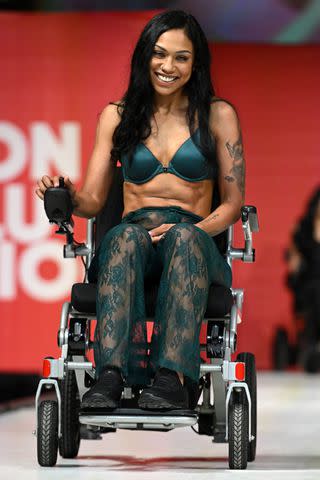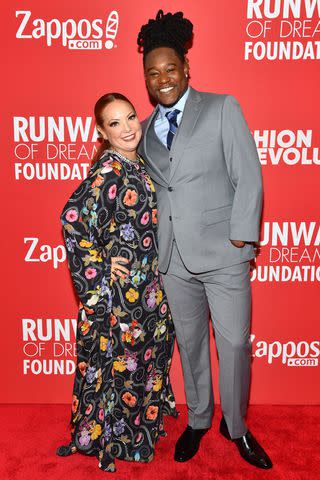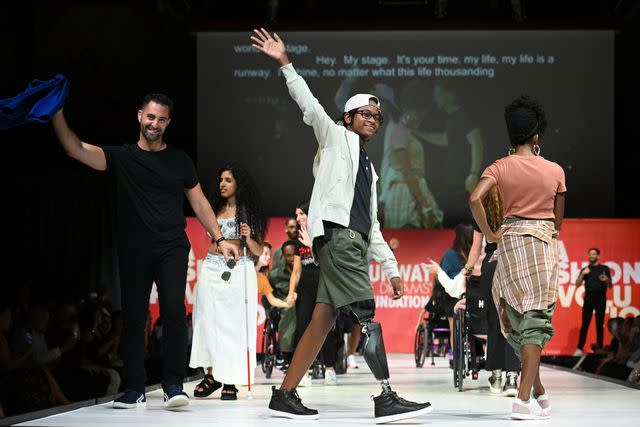Runway of Dreams Returns to NYFW to Showcase Clothing Made for People with Disabilities: 'Really Special'
"Seeing the confidence and the power of every model going down that runway is game-changing," Runway of Dreams Foundation founder Mindy Scheier tells PEOPLE

Noam Galai/Getty
Models at the Runway of Dreams: A Fashion Revolution NYFW show on WednesdayThis year’s New York Fashion Week made dreams come true.
The Runway of Dreams Foundation, a public charity dedicated to fashion and beauty inclusivity for those with disabilities, held their adaptive fashion show on Wednesday, featuring brands such as Zappos, Steve Madden, Tommy Hilfiger, Target and for the first time, Victoria’s Secret and PINK.
“I spent 10 years in a wheelchair and I dreamed about seeing something like this,” Victoria Arlen, a TV personality and model at the Wednesday night fashion show, tells PEOPLE. “I wish I could go back to younger Victoria and say, 'Guess what, girl, it's happening, and there's going to be other Victorias in wheelchairs rocking the runway right next to you.'"
"Never in a million years would have imagined this," she adds. "It’s really special.”

Noam Galai/Getty
Elicia models on the runway during Runway of Dreams: A Fashion Revolution at Powerhouse Arts on September 13, 2023Related: Open Style Lab Spotlights Disability Awareness and Fashion Inclusivity at NYFW
The show was hosted by former NFL linebacker Shaquem Griffin and featured 70 models with varying disabilities and backgrounds. What all of the models shared was an excitement to be on the runway and embrace their differences.
Related: 22-Year-Old Latina Model with Down Syndrome Says 'There Are No Limits' After Modeling at NYFW
“I started modeling before I lost my legs,” says Alexis Bader, who wore Zappos on the "empowering" runway. “Doing disability modeling, showing companies what disability is about and showing that people with disabilities can still be fashionable and still do the runway and still represent brands just as much as anyone else is big for me.”
Never miss a story — sign up for PEOPLE's free daily newsletter to stay up-to-date on the best of what PEOPLE has to offer, from juicy celebrity news to compelling human interest stories.
Runway of Dreams model Jay Manuel adds, “A night like this with so much representation is important because we don't get to see it in our daily lives, so it shows that you're not alone and that there's a community in the disability space and we're able to be fashionable too.”
Founder and CEO of Runway of Dreams Mindy Scheier has a personal relationship with the cause. “One day my now 18-year-old son with muscular dystrophy came home from school and said he just wanted to wear jeans like everyone else,” the fashion designer tells PEOPLE. “It was a real kick in the stomach, ‘AHA’ moment, that everybody wants to look as good as they possibly can, no matter what their ability.”
"Seeing the confidence and the power of every model going down that runway is game-changing," Scheier adds.

Noam Galai/Getty
Mindy Scheier and Shaquem Griffin attend Runway of Dreams: A Fashion RevolutionWhat started with one partnership in 2016, Tommy Hilfiger, has since turned into a runway full of models wearing adaptive and universally-designed apparel and footwear from numerous brands.
This year also marked the debut of Victoria's Secret and PINK's first-ever adaptive intimates.
Related: Sofía Jirau, 24, Becomes Victoria's Secret's First Model with Down Syndrome: 'Dream Come True'
For Chris Ruden, who has been modeling with Runway of Dreams since 2018, these fashion shows have helped shape who he is as a person. “My entire life I thought I was broken, and it took doing a fashion show to realize that not only was I not broken, I was amazing,” Ruden tells PEOPLE.
“Back then I would've never even fathomed being in front of one person while showing my arm or my hand. Now I do it for a living, as a keynote speaker about overcoming adversity," he adds. "This night is a reminder that our differences are not only normal, they're amazing, and we need to lean into that and embrace it because we all deserve to feel confident when we wake up, when we go to sleep and most importantly, with the clothes we put on."

Noam Galai/Getty
Talent model on the runway during Runway of Dreams: A Fashion Revolution at Powerhouse Arts on September 13, 2023Looking forward to the future, Ruden says, despite loving this show, he hopes it won’t need to happen.
“I hope that we don't have to talk about diversity, equity, and inclusion because it's normal," Ruden adds. "We don't have to force the subject of getting people to come together. That disability is not a bad word anymore. There's no more stigma.”
For more People news, make sure to sign up for our newsletter!
Read the original article on People.
